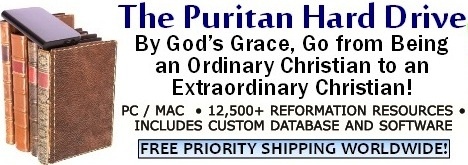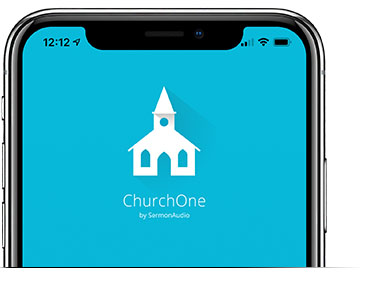 Loading... Please wait...
Loading... Please wait...- SWRB Home
-
Free Resources
- Short Listings Of Free Reformation & Creation Resources
- Free Reformed, Puritan, Covenanter and Creationist Videos
- Thousands of Links to Free Audio, Video and Printed Resources
- Free Puritan Books, Reformed MP3s, and Calvinist Videos
- Puritan Quotes, Free Reformation MP3s, Reformed Books and Calvinist Videos From PuritanDownloads.com On FaceBook
- Shipping & Returns
- Blog
- Privacy Policy
- Contact Us
- Payment Options
- Help
-
About Us
- Sitemap
Pastor Scott Brown, on the left in the video above, is the Director of the National Center for Family-Integrated Churches (NCFIC)
Resource Categories
- PURITAN HARD DRIVE REVIEWS
- PASTOR ROB VENTURA ON THE PURITAN HARD DRIVE
- DR. VODDIE BAUCHAM, JR. ON THE PURITAN HARD DRIVE
- R. C. SPROUL ON SWRB
- DR. JOEL R. BEEKE ON THE PURITAN HARD DRIVE
- PASTOR GREG L. PRICE ON THE PURITAN HARD DRIVE
- DR. MATTHEW MCMAHON ON THE PURITAN HARD DRIVE
- PASTOR SCOTT BROWN ON THE PURITAN HARD DRIVE
- PASTOR W. J. MENCAROW ON THE PURITAN HARD DRIVE
- JOAQUIN FERNANDEZ ON THE PURITAN HARD DRIVE
- PASTOR DAVID SILVERSIDES ON THE PURITAN HARD DRIVE
- JOHN HENDRYX ON THE PURITAN HARD DRIVE
- PASTOR KEVIN GUILLORY ON THE PURITAN HARD DRIVE
- RICHARD BENNETT ON THE PURITAN HARD DRIVE
- DR. KENNY RHODES ON THE PURITAN HARD DRIVE
- JUSTIN RAWSON ON THE PURITAN HARD DRIVE
- PASTOR JAMES WALLACE ON THE PURITAN HARD DRIVE
- PASTOR RICHARD GAGNON ON THE PURITAN HARD DRIVE
- PASTOR JOE HAYNES ON THE PURITAN HARD DRIVE
- DR. STEVEN DILDAY ON THE PURITAN HARD DRIVE
- PASTOR ANDREW COMPTON ON THE PURITAN HARD DRIVE
- TERENCE ELLARD ON THE PURITAN HARD DRIVE
- PASTOR JERRY JOHNSON ON THE PURITAN HARD DRIVE
- PASTOR DAVID PETRIE ON THE PURITAN HARD DRIVE
- JIM DODSON ON THE PURITAN HARD DRIVE
- PASTOR BRIAN SCHWERTLEY ON THE PURITAN HARD DRIVE
- PASTOR PHIL GIBSON ON THE PURITAN HARD DRIVE
- MEL R. EVERINGHAM II ON THE PURITAN HARD DRIVE
- PAUL BLYTH ON THE PURITAN HARD DRIVE
- STEVE KETTLER ON THE PURITAN HARD DRIVE
- D. M. (CALIFORNIA) ON THE PURITAN HARD DRIVE
- MICHAEL CAUGHRAN ON THE PURITAN HARD DRIVE
- WIILIAM NOPPER IV ON THE PURITAN HARD DRIVE
- LINDA THERIAULT ON THE PURITAN HARD DRIVE
- WILLIAM WARNOCK ON THE PURITAN HARD DRIVE
- ROBERT KOH ON THE PURITAN HARD DRIVE
- WHAT'S ON THE PURITAN HARD DRIVE?
- ALL PURITAN HARD DRIVE VIDEOS
- PHD-ODE INSTALLATION VIDEOS
- COMMENTS ON SWRB
- ALL PURITAN QUOTE VIDEOS
- PURITAN HARD DRIVE SCREENSHOTS
- PURITAN HARD DRIVE MINISTRY AND DONATION OFFERS
- TABLE OF RESOURCE CATEGORIES
- Advanced Studies
- SWRB SERMONAUDIO MOBILE APP
- Apologetics
- Assurance
- Attributes and Holiness of God
- Augustine
- Banner of Truth
- Baptism
- Beginners
- Bibles (Geneva, KJV, Hexapla, etc.)
- Biblical Counseling
- BIBLICAL HD COLLECTION
- Biblical Interpretation (Hermeneutics)
- Biographies and Autobiographies
- Calvinism and the Sovereignty of God
- CALVINISM HD COLLECTION
- CALVINIST CLASSICS HD COLLECTION
- Charles Spurgeon
- Children's Books
- CHRISTIAN EDUCATION HD COLLECTION
- Christian History
- Church Government
- Civil Government and Resistance
- CLASSIC CHRISTIAN HD COLLECTION
- Classic Puritan and Reformed Sets
- Commentaries
- Contemporary Issues
- Covenant Theology and Covenanting
- COVENANTER HD COLLECTION
- Covenanters and Covenanted Reformation
- Creation and Creationism
- Creeds, Confessions and Covenants
- Cults, False Religions, Psychology, Humanism
- Dealing with Affliction, Suffering, and Sickness
- Debates
- Dutch Reformed
- Education and Home Schooling
- English Puritans, Covenanters and Reformers
- Family, Children, Home, and Family Worship
- First Reformation
- Five Points of Calvinism (TULIP)
- For Pastors and Elders
- For Seminary Students
- FREE PURITAN & REFORMATION MP3 AUDIO SERMONS/BOOKS
- FREE PURITAN BOOKS, REFORMATION MP3s, PDFs, VIDEOs
- George Gillespie
- God's Law, The Ten Commandments, etc.
- Greg L. Price on Headcoverings
- Heaven, Hell and the Final Judgment
- Holy Days (Lord's Day, Christmas, Easter, etc.)
- HOME SCHOOL HD COLLECTION
- Intermediate Studies
- John Bunyan
- John Calvin
- John Knox
- John Owen
- Jonathan Edwards
- Justification
- Languages, Dictionaries, Reference, etc.
- LOOK WHO LOVES THE PURITAN HARD DRIVE
- Lord's Supper (Communion)
- Marriage, Courtship, etc.
- Martin Luther and Lutheranism
- Martyrs and Persecution
- Other Protestant Works
- Predestination and Providence
- PRESBYTERIAN HD COLLECTION
- Presbyterians and Presbyterianism
- Prophecy, Antichrist, and Eschatology
- PROTESTANT HD COLLECTION
- PSALM SINGING MP3s (COMPLETE SET)
- Psalters, Psalm Singing and Music
- Puritan Facts
- PURITAN FAST SERMONS (1640-1653) - 34 VOLS SET
- Puritan Fast Sermons 1640-1653
- Puritans and Puritanism
- PURITAN HARD DRIVE
- REFORMATION HD COLLECTION
- Reformation History
- Reformed and Puritan Classics
- Reformed Baptist
- REFORMED BAPTIST HD COLLECTION
- REFORMED HD COLLECTION
- REFORMED PRESBYTERIAN HD COLLECTION
- Reformed Presbytery, RPNA Protesters, etc.
- Reformed Theology
- Reformed Worship, The Regulative Principle, etc.
- Roman Catholicism, the Jesuits, Islam, etc.
- Salvation and Evangelism
- Samuel Rutherford
- Sanctification, Prayer and Holiness
- Scottish Covenanters
- Scottish Presbyterianism
- Scripture Song MP3s (Psalms and Bibles Verses)
- Second Reformation
- Separation, Unity, Uniformity, etc.
- Sermons and Sermon Collections
- Solemn League and Covenant
- Theology and Doctrine
- Third Reformation
- Thomas Watson
- Westminster Confession, Assembly and Divines
- Authors (All A to Z)
Phone Orders:
(780) 450-3730
To obtain free Reformation books, Puritan MP3s and Calvinistic videos, SWRB discount coupons, etc., add yourself to SWRB's Puritan and Reformed email list by using the form above.
- Home
- Free Resources
- Thousands of Links to Free Audio, Video and Printed Resources
- ESTABLISHED RELIGION: AN INESCAPABLE CONCEPT - Dr. Michael Wagner (Reformed Quote)
ESTABLISHED RELIGION: AN INESCAPABLE CONCEPT - Dr. Michael Wagner (Reformed Quote)
ESTABLISHED RELIGION: AN INESCAPABLE CONCEPT - Dr. Michael Wagner (Reformed Quote)
ESTABLISHED RELIGION: AN INESCAPABLE CONCEPT
For most modern North Americans it seems that "religion" is looked upon as some sort of a hobby in which one may or may not participate at his leisure. Many would view themselves as having little or nothing to do with religion. "Religion is something in which other people are involved as a private endeavour. It is mostly harmless as long as it remains a private matter." But if people are openly motivated by religious concerns in their public affairs, politics in particular, religion is then thought to have intruded into a "secular" area from which it should be forbidden.
This view, however, displays a marked ignorance of what religion really is. The term "religion," in its most meaningful sense, actually refers to the underlying beliefs that everyone has about the meaning of life. In this way it is clear that all people hold to some form of religion. Paul Marshall has explained it well.
Religion refers to the deepest commitment and deepest identity of a person or group. Hence, the opinion that one may discuss constitutions, politics, education, or sex without any reference to God is as much a religious view as the opinion that we are responsible to God in all we do. An expanded concept of religion allows us to take account of the fact that our lives reflect and are rooted in a particular view of the meaning of life: of the nature of society; of what human beings really are; and of their essential responsibilities, whether to self, society, or another source (1992, 6).
Thus religion is an inescapable aspect of life. Everyone has a religious viewpoint whether they acknowledge it or not. Man is a religious being.
The fact that man is a religious being is very significant for politics and government. Every aspect of life is infused with religious meaning. Each person's views about the origin and purpose of government are fundamentally based on some religious perspective. Human societies are characterized by a common religious foundation which provides cohesion and a basis for law. R.J. Rushdoony has done much to bring this to light.
Every state is a law order, and every law order represents an enacted morality, with procedures for the enforcement of that morality. Every morality represents a form of theological order, i.e., is an aspect and expression of a religion. The church thus is not the only religious institution; the state also is a religious institution (1986, 7).
It is very important to understand, as Rushdoony points out, "that in any culture the source of law is the god of that society" (1973, 4). This is closely related to the fact that "[b]ecause law governs man and society, because it establishes and declares the meaning of justice and righteousness, law is inescapably religious, in that it establishes in practical fashion the ultimate concern of a culture" (Rushdoony 1973, 4). It is clear, then, that not only is religion relevant for issues of law, politics, and government, but it cannot be separated from them. Every society has a religious basis, and cannot exist without that specific religious basis. "Since the foundations of law are inescapably religious, no society exists without a religious foundation or without a law-system which codifies the morality of its religion" (Rushdoony 1973, 5).
The result of this significant insight is that "every state or social order is a religious establishment" (Rushdoony 1986, 7). In other words, "no disestablishment of religion as such is possible in any society" (Rushdoony 1973, 5). Hence the question is never "Should we have an established religion, or not?"; rather, the question must be "Which religion should be the established religion?" We cannot escape the fact that our society, and every other society, has always had, and will always have, an established religion, whether implicitly or explicitly. The liberty and prosperity that we still (decreasingly) enjoy are residuals from an implicit Christian foundation that is quickly being eroded and replaced by the religion of secular humanism.
Once it has been demonstrated that every society has an established religion, it should not be necessary to ask any Bible-believing Christian which religion should be established. Obviously Christianity is the only acceptable choice because it is the only true religion. Since as Christians we are to be honest, there is no reason why we should shy away from being explicit about the necessity of a Christian establishment. However, since there are so many sects that go by the term "Christianity," we need to define the "brand" of Christianity that is to be established. Our society cannot rest on an ambiguous concept of Christianity. As Rushdoony, again, writes, "[e]very social order rests on a creed . . . The life of a society is its creed" (1968, 219). Thus a creed giving the best expression of the Christian faith is an indispensable document for an explicit establishment of Biblical Christianity.
The idea of having a creed that is very specific and well-defined in terms of the type of Christianity it expresses sounds very narrow and exclusive, and it is. Assuming it is a very Biblical creed, such as the Westminster Confession of Faith, it excludes all erroneous and heretical conceptions of Christianity. This is important with regards to political matters. By having a general and ambiguous creed, it would be less clear how God's Law is to be interpreted for application in the social and political realm. If a dispensational interpretation of the Law was accepted by the state, virtually all of the benefits of having a Christian establishment would be nullified. Other theological persuasions would also be disastrous for a true Christian state. With the Westminster Confession of Faith as a guide to interpreting the Scriptures, the civil authorities would be able to act according to the will of God in political matters, rather than according to the subjective opinions of men.
The Westminster Confession of Faith is completely Biblical. "For fidelity to Scripture, for 'logical fearlessness and power,' for 'theological comprehensiveness, and intellectual grandeur,' it is second to none" (Tallach 1980). Unfortunately, this paper is not the place to go into a comparative Biblical analysis of various creeds and confessions. However, those who investigate the matter seeking to please the Lord alone, will find that the Westminster Confession is the most Biblical. For expositions of the Confession, see Shaw ([1845] 1980) and Williamson (1964). Interestingly, the Assembly that wrote the Confession was called together by a civil government for the express purpose of composing a creed that would be used not only by the church, but also by the state. For more information on this see Hetherington's History of the Westminster Assembly of Divines ([1856] 1991, 122ff).
- Dr. Michael Wagner, A PRESBYTERIAN POLITICAL MANIFESTO: PRESBYTERIANISM AND CIVIL GOVERNMENT
Jim Dodson Reviews and Recommends the Puritan Hard Drive

If you love the Bible, then you may well be Reformed. If you think of yourself as Reformed, but you have seldom or have never read older Reformed literature, prepare to be challenged. The Puritan Hard Drive provides primary sources and depth of theological and spiritual insight which is lacking in much of what is passed off as genuine Reformed theology. If you think of yourself as conservative, the older Puritan and Reformed authors will help you sort reality from myth in your quest to be truly Reformed. There are more solid resources for less money here than anywhere else. I highly recommend you take responsibility for your soul and spend a few shekels for this cup of cold water in the midst of the modern religious desert.
- Jim Dodson, Reformed Presbyterian Scholar, https://www.covenanter.org/
ESTABLISHED RELIGION: AN INESCAPABLE CONCEPT - Dr. Michael Wagner (Reformed Quote)
Phone Orders:
(780) 450-3730
To obtain free Reformation books, Puritan MP3s and Calvinistic videos, SWRB discount coupons, etc., add yourself to SWRB's Puritan and Reformed email list by using the form above.
Current Top Sellers
-
1
-
2Puritan Hard Drive - On Demand Edition for Windows
$2,897.97$597.97 -
3Puritan Hard Drive - On Demand Edition for Mac
$2,897.97$597.97 -
4
-
5






























